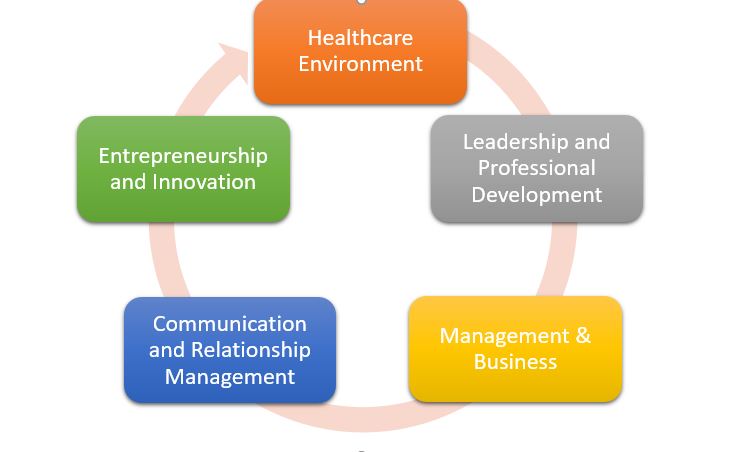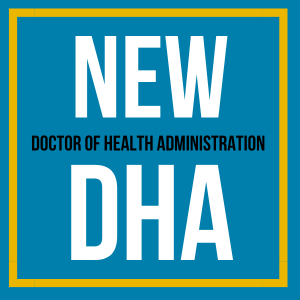Graduate Program
Master of Health Administration (MHA) Competency Model
The MHA competencies provide a solid examination of the complexity of the healthcare environment, develop students as leaders and consummate professionals, provide foundational business and management skills/knowledge and emphasize innovation and entrepreneurship to assure that our students are prepared for the rapidly changing healthcare environment whether aspiring as early careerists or mid careerists. The MHA’s curriculum of 19 competencies within five domains provides students with the following:
- A fundamental understanding of the healthcare environment with its complexities and dynamic nature, providing a foundation upon which to build other competencies.
- Development as leaders and professionals with focus on management style, and the links between planning, organization, and success, as well as a lifelong commitment to ethical decisions and professional development.
- A comprehensive set of business skills necessary to grow as managers and leaders in the healthcare field.
- Enhancement of communication abilities, relationship management and team dynamics.
- An appreciation of innovation and entrepreneurship to deal with change management and build sustainable health systems.
Job analysis surveys conducted on a regular basis under the auspices of the American College of Healthcare Executives (ACHE) have identified well over 150 detailed competencies “needed to successfully perform as a healthcare manager regardless of the setting.” Within this larger context, MHA programs typically identify domains and competencies that are consistent with their mission and goals. The following graphic represents the five domains within which the 19 competencies core to the Rutgers MHA program are contained.

Every core course in the program is linked to one or more of these competencies and it is the student’s responsibility to understand the nature of the competency and how he/she is developing such competencies as one progresses through the program toward graduation. Knowledge of these competencies should be considered essential.
1. The Healthcare Environment
- 1.1 Healthcare Structure: Compare and contrast different types of health services organizations, insurance providers, and healthcare providers. (Target level: 5)
- 1.2 Health policy, law, and ethics: Examine the health care policymaking process and be able to critique ethical and legal issues at the local, state, regional, and national level. (Target level: 6)
- 1.3 Healthcare quality: Analyze the essential domains of healthcare quality assurance (Safe, Effective, Patient-centered, Timely, Efficient, Equitable) and apply efficient measures of improvement. (Target level: 6)
- 1.4 Disparity in clinical and population-level health outcomes: Analyze the sources of existing disparity in health outcomes, both at an individual and community level, and predict appropriate measures needed to improve population health (Target level: 5)
2. Leadership and Professional Development
- 2.1 Leadership theories, styles, and practices: Compare and contrast different leadership theories, styles, and practices, and support concepts for change management in a variety of health care organizations. (Target level: 6)
- 2.2. Strategic planning: Examine the importance of the strategic planning process in a healthcare organization and predict how this process will certify the organization’s mission, vision, and efficient allocation of resources in different situations. (Target level: 5)
- 2.3 Ethical leadership and commitment to life-long learning: Evaluate the foundation of ethical values and relate these values to ethical responsibilities and a commitment to life- long learning. (Target level: 6)
3. Management and Business
- 3.1 Quality improvement and measurement: Evaluate the importance of quality improvement tools (i.e.: LEAN, Six Sigma) and illustrate their functional use to improve clinical and operational outcomes. (Target level: 5)
- 3.2 Financial analysis and budgets: Analyze and apply the fundamentals of financial management and budgeting principles and be able to differentiate between various financial reports and matrixes to measure organizational performance. (Target level: 6)
- 3.3 Operational management: Compare and contrast a variety of different approaches for healthcare delivery and organizational management of services. (Target level: 6)
- 3.4. Human resource management: Examine various principles of human resource management and regulatory requirements in healthcare to generate a plan for improvement in health care delivery. (Target level: 5)
- 3.5 Health Information systems: Appraise the role of health information systems for administrative and clinical purposes and support the necessity for HIS with emerging issues like cybersecurity, data privacy and security of healthcare information. (Target level: 5)
- 3.6. Ethics and compliance: Assess ethics and regulatory compliance issues in healthcare and create plans to improve compliance within healthcare systems. (Target level: 5)
- 3.7 Data Analytics: Compare and contrast various statistical analysis techniques and the use of data visualization software to support the use of healthcare data for benchmarking and business intelligence. (Target level: 5)
4. Communication and Relationship Management
- 4.1 Written Communication: Construct appropriate written reports, memos, and papers using effective written business communication skills. (Target level: 6)
- 4.2 Oral Communication: Compose narratives to produce effective verbal communication skills, in both individual and group settings. (Target level: 6)
- 4.3 Team Dynamics: Evaluate the importance of teamwork in a healthcare setting and design competencies to work effectively in different roles within a team. (Target level: 5)
5. Entrepreneurship and Innovation
- 5.1 Entrepreneurship and Innovation: Compare and contrast examples of disruptive technologies and apply it to the healthcare industry to promote innovation. (Target level: 5)
- 5.2 Emerging Technologies: Examine the role of emerging technologies on the healthcare delivery system and predict consumer behavior. (Target level: 5)
For all 19 competencies, students will find themselves situated at different levels of expertise—from 1 (novice) to 10 (expert). The Residential MHA is intended to move students sequentially from novice (1-2) to advanced beginner (3-4) and to competent (5-6) by graduation across all competencies. Every core course in the program is linked to one or more of these competencies and it is the student’s responsibility to understand the nature of the competency and how he/she is developing such competencies as he/she progresses through the program toward graduation. Knowledge of these competencies should be considered essential. While the competency scale runs from 1 to 10, levels 7-10 reflect a level of knowledge and skill that can only be achieved following decades in the field, advanced studies (e.g., Doctor of Health Administration), or dedicated experiential learning (e.g., special fellowships). For this reason, the Rutgers MHA competency matrix reflects “life-long learning”—that is, students will continue to learn and develop outside and beyond the MHA program.
Top Ranked program in New Jersey
Program Resources
Faculty
Program Faculty & Fellows
Student & Academic Services
Steve Weston
Assistant Dean of Academic Administration
Courtney Culler
Associate Director for Graduate Student Services
Greg Marrero
Senior Counselor, Graduate Student Services
Andrea Garrido
Assistant Director for Career Management for Planning, Policy, and Informatics Masters Students
Cheryl Egan
Assistant Director for Career Management for Health Administration Masters Students
Get to Know our Students
“Motivated by my commitment to personal growth and driven by my aspirations to become a healthcare leader, I made the conscious choice to embark on an MHA journey. I saw the Rutgers MHA program as the perfect blend of healthcare and business, offering me the best of both worlds.”
“I would definitely recommend the Bloustein MHA program. The professors and administrators of the program are always willing to help and there is a tight-knit feel to the cohort that has given me great confidence.”
“One of the reasons I picked this program was because all the faculty had real-world experience and they are here for us to learn from! Additionally, the MHA program has great resources such as the career office, which is always holding career events, excel workshops, and writing workshops. Also, since the Rutgers MHA program is CAHME accredited we have access to participate in case competitions.”
“The best thing about the Rutgers MHA program is the faculty of highly knowledgeable and compassionate professors. These educators bring a wealth of expertise to the classroom. They demonstrate genuine enthusiasm for teaching and a sincere desire to see their students excel. Rutgers MHA professors create a nurturing atmosphere that encourages open dialogue and fosters a true desire among students to learn from their vast expertise.”



